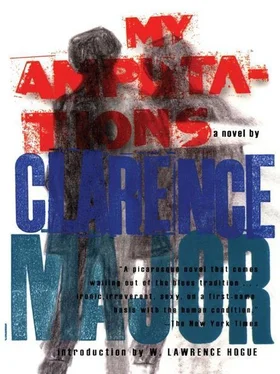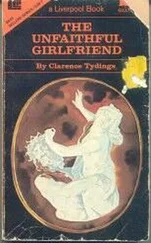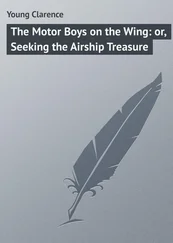Clarence Major - My Amputations
Здесь есть возможность читать онлайн «Clarence Major - My Amputations» весь текст электронной книги совершенно бесплатно (целиком полную версию без сокращений). В некоторых случаях можно слушать аудио, скачать через торрент в формате fb2 и присутствует краткое содержание. Год выпуска: 2008, Издательство: Fiction Collective 2, Жанр: Современная проза, на английском языке. Описание произведения, (предисловие) а так же отзывы посетителей доступны на портале библиотеки ЛибКат.
- Название:My Amputations
- Автор:
- Издательство:Fiction Collective 2
- Жанр:
- Год:2008
- ISBN:нет данных
- Рейтинг книги:5 / 5. Голосов: 1
-
Избранное:Добавить в избранное
- Отзывы:
-
Ваша оценка:
- 100
- 1
- 2
- 3
- 4
- 5
My Amputations: краткое содержание, описание и аннотация
Предлагаем к чтению аннотацию, описание, краткое содержание или предисловие (зависит от того, что написал сам автор книги «My Amputations»). Если вы не нашли необходимую информацию о книге — напишите в комментариях, мы постараемся отыскать её.
My Amputations — читать онлайн бесплатно полную книгу (весь текст) целиком
Ниже представлен текст книги, разбитый по страницам. Система сохранения места последней прочитанной страницы, позволяет с удобством читать онлайн бесплатно книгу «My Amputations», без необходимости каждый раз заново искать на чём Вы остановились. Поставьте закладку, и сможете в любой момент перейти на страницу, на которой закончили чтение.
Интервал:
Закладка:
And so it went. Despite a weird dream about the kids he reached the next day without a bad head. Heading for Legon, Makola wanted to give the American a glimpse of Independence Square and the Arab market but Mason saw them through haze. Clusters of sidewalk vendors were everywhere. Their leather crafts, dresses, jewelry, masks, were spread out on sheltered tables along the main streets where the traffic was hectic, stalled, and where dust clouds lifted to the bat-filled grand old trees also lining the roads. Every street corner was a small community focus of solemn women and men and children who waited to sell their wares and produce: plantains and shrunken fruit and palm oil. Dogs lean and hungry wandered restlessly in the dust in and out of side-streets. Neighborhood women set up blocks to force drivers to pay to pass along their pitted, rock-laden dirt roads…. Part of the presentation was a flop because nobody'd heard of the Afro-American writers he referred to: Wideman, Shange, Reed, Charles Wright, not even Zora Neal Hurston. Cultural gap? Distance. It left him gloomy. Catching, huh, Makola was apologetic, reassuring. Then Mason read from his infamous work-in-progress:
“… he touched Florence's shoulder. ‘We have to go.’ She was ready. ‘You're on.’ As they travelled they talked the past. ‘Everybody in New York was serious in the sixties. The terror was not yours alone, then. The lost witch in the craft was rediscovered: politics, war, disillusionment were never the solutions. You could establish a forced logical connection between any two completely unrelated things: make a collage or cubist plot of yourself, your life.’ Unable to find a suitable used struggle-buggy at Don's Easy-Terms Used Car Lot, they were on a Trailways. He spoke thickly, quickly. ‘I tried that, too. Edith Levine lived with me then…. ’ Flo cut: ‘Nobody cares about your dead past. Especially if you're not making the forced connections pretty and powerful. Listen, I knew an Indian girl who tried to resolve what she saw as a dilemma: by making a connection between herself and political ideas, specific ones — I forget which—.’ Mason scowled. Flo: ‘She stood, pink as puppy mouths, on a corner handing out leaflets for a cause she didn't herself fully understand; meant well as she stood on centuries of rage and corruption. Disillusioned, she went to work as a fast-food waitress at Quick Snack. She had the biggest, sweetest smile, back there behind the counter, with all those coffee cups, plastic plates, stainless steel knives, forks, spoons, sundae bowls, salt and pepper shakers, all, repeated dizzingly in the mirrors that surrounded her in her baby-green, snot-yellow uniform with its starched dainty collar decorated with tiny embossed elephants smacking on giant burgers…. ’ Mason: ‘Making forced connections in 1966 I first went to New York: felt intense among rug dye factories. You could be against racism without being against sexism and vice versa. Radical lesbians attempted to impregnate themselves with chemicals from their own bodies. There's no metaphor. Morality and moral fiction were in suspended animation. (Art hasn't saved anybody: appletrees, appletrees. Which appletrees?) Anyone could be shot or made. But you were there: you know—.’ His memory was a thin layer of Matisse-green juxtaposed with a self-consciously brushed-in pink. But he could not now yank himself out of the climb: ‘Look at me: I lost my name in that fucking place! My father was already dead and the iron years were behind me — those years: I punched a clock and welded metal together in a steel circus…. Before Attica — after the city of dirty el trains and Richard Wright's crash at Roosevelt Road when Cross got his chance to switch identities. I smoked cigarettes — a tough guy — and tried to look like Jack Johnson, act like Jack London, strike with the certainty of Jack da Ripper. Back then, Celt was with me often and guided me through the early stages — my apprenticeship. She hovered above me, bright as a Veronese Venus, editing, shaking her finger in my face when I lost intense concentration on the charged image, the driven word. Now, who knows where Celt might be: a halo over my enemy's head? I went on, Florence, raving about, say, the immortal leadership spirit of the underground railway, in poems, stories; in pictures — framing my chaos: brown men with glittering ornaments wearing gold and flat plates in their lower lips hundreds of years before slavery. On the Qt., I had a mission. I was going to be a writer: hadn't learned that illustration wasn't painting. You get it. Too much glutted-Glackens, not enough Pollack-pull or de Kooning-cool; too much… I had something to say before I knew I had something to make . My forced connections hadn't registered. I cried out about poverty and death in Liberia. Imagine that! Felt my own face: it was a billboard facing a Liberian market place; beggars whimpering; hombres prowling; boney children crouched in damaged doorways and shitting in the sand by the death-river; everybody hungry, crazy; miserable. This, while tourists snapped pictures of them. I was pissed, Miss. I knew then I'd never known real poverty nor seen it. I was not Gauguin on a white horse under a red tree…. ’ Florence gazed beyond the window. She coughed. Kissed his cheek. There was challenge in her voice: ‘Perhaps it's better to be quiet: as on a Sunday morning, quiet as it can be in a glass telephone-booth on a Sunday morning; quiet and unclear or clearly unfocused like an old senile woman I saw once searching the coin-return-slot in a telephone-booth; dressed in 1923-laced-up boots. I claim that view for all time. But you can share it with me, Key of C. She went into the booth almost too quickly: as though she was about something urgent; pretended to search for a thing in her purse and pockets. Her identity? Through her action she was creating it! It was winter: but the booth was a closure as “hot” as Henri's Red Studio— as familiar. And she was cool in a heavy black coat with her tiny pink face at its top above a big button. The phone to her ear, pretending to talk, then, on the sly, with the index finger of the free hand she searched, with real thrust, the coin-return-slot. I tell you, I was a witness to her draped-disappointment — and her warped dignity. But silence was her forte. I felt sorry…. ’”
Kalmoni lived in a house that was about two steps above a hut. That was all right. But he had electricity and gas. About half the guests who'd attended the dinner party at Robert Astor's were here. The most striking difference between this home and the Astor's was the degree of light. Kalmoni's dwellings were almost totally in shadows with dim pockets of either candle or soft lamp light with only two or three electric currents juiced. Everybody was more relaxed. Amos Achimota held forth from the rattan couch. He said, with British accent uppermost, “I apologize for not attending your lecture today, but my health… you know. I've heard, however, that it was not well received. I've also heard that the reason it was not had to do with your subject matter…. ” Mason closed his eyes and faked falling asleep. The room was so dark nobody saw the gesture. Janet laughed and said, “Mister Achimota, with all due respects, Sir, I wish to interrupt: Our visiting writer is a guest in our country. Do you mind if we shift the mood of our little party and try to make him feel at home? After all, you know, he is—” five or six other voices rushed in, cutting off in mid-word: Nsawam felt Black people could be honest among themselves — Mason was not to be spared. Aburi said, “We're here to enjoy… ” Kalmoni spoke: “Whatever you have to say, say it quickly: time is short. Remember the Revolution!” Now they laughed at themselves. And this was the moment that was needed. The mood of the party shifted and Mason became their friend. He may have survived The Middle Passage and returned whole but he was not so affected as to be without a sense of humor. And he could take it . Achimota was somber throughout the rest of the gathering. Near seven-thirty he said to Mason, “When you get back to America, I hope you'll keep in mind the seriousness of our plight. Langston Hughes knew. Richard Wright knew. Our African writers know. You must know. I'm happy to have met you…. ” Also near the end of the party Danquah and Aburi and Kaneshire were locking horns in a raging argument over whether or not tribalism was valid in the face of a Marxist alternative for themselves as a struggling people. Aburi damned the notion of the Chieftain tradition (“No man should have to carry another man!” he said with exquisite theatrical poise). Janet described her work in the interior as “political”—she was teaching Ghanaian children to respect their own myths and ceremonies, their cultures and traditions, and, yes, their religions. The conversation left Mason crowded with misty secrets of his own unfinished transfiguration. These matters — their plight — were not his raw October. He shivered as Makola drove him back. His self-interest for the first time made snow fall in the ditch of his brain. He wanted to take somebody's hand but there was nobody. How could he come out of his fever and share his sickness? That search for The Impostor now lost had turned inward where the helpless wings of death beat in his night: making every effort, desire, mere specks in an endless constellation. For a moment he almost turned to Makola. But words were only dice in the shaking hand!
Читать дальшеИнтервал:
Закладка:
Похожие книги на «My Amputations»
Представляем Вашему вниманию похожие книги на «My Amputations» списком для выбора. Мы отобрали схожую по названию и смыслу литературу в надежде предоставить читателям больше вариантов отыскать новые, интересные, ещё непрочитанные произведения.
Обсуждение, отзывы о книге «My Amputations» и просто собственные мнения читателей. Оставьте ваши комментарии, напишите, что Вы думаете о произведении, его смысле или главных героях. Укажите что конкретно понравилось, а что нет, и почему Вы так считаете.












